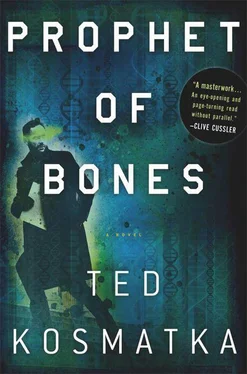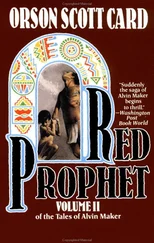Gavin stared at him. “The plan? What do you mean you…” But Gavin couldn’t finish, a suspicion freezing the words on his tongue.
“I mean nothing but exactly what I said,” Martial responded. “More than that, you’ll understand in good time.” The old man looked directly at him. “But for now, there is something I don’t understand.”
“What is that?”
“Paul.”
Gavin studied Martial’s face, but it gave away nothing. Behind him, up the trail, Gavin again noticed the three men in suits.
“You told me to pick the best team, so that’s what I did,” Gavin said. “You said I could pick whoever I wanted.”
“And you picked him, of all the samplers?”
“I did.”
“Why?”
“He came highly recommended. He had the right credentials.”
“Do you think I’m a fool?”
Gavin thought of the pacing cat. “Because I was curious,” he said. “And I felt he was owed something.”
“Owed something.” The cracked and failing voice became steel. “What was owed?”
Gavin met the old man’s eye and said nothing.
Martial nodded. “Do you feel the debt is paid?”
“I wish I’d never involved him. I regret it. If I’d known it would happen like that, I never would have brought him to the island.”
In the distance, the strange sound came a third time. The distorted cry. The skin tightened at the back of Gavin’s neck.
He looked into the old man’s face and found the usual confidence had vanished, replaced by the expression of a man who didn’t have all the answers. The cry continued, rising higher, a strange mewling like nothing Gavin had ever heard before.
“I was told that he crushed a man’s throat,” the old man said.
“I don’t know anything about that.”
“If true, it was an unusual response to the circumstances. An unexpected response.”
“What would have been the expected response?”
“To those circumstances? To die, of course.” The old man rubbed his palm over his sweating head. “You brought him into this.” The old man’s eyes burned. “You are responsible for what happens.”
“I understand.”
Martial nodded to himself. “You’ve put me in a very difficult situation.”
“No more difficult than if it had been somebody else on the team.”
“Again, you call me a fool.”
“If not him, it would have been somebody.”
“But it wasn’t.”
“No.”
The old man turned to look at the crouching chimps.
After a moment, he spoke: “So then tell me this. Is he his father’s son?”
“In some ways.”
“Is he going to let this go? The deaths. The things he’s seen.”
“He might.”
The old man shielded his eyes from the sun, still blazing even as it set. He wiped his cracked lips with the back of his hand and coughed into his handkerchief again. Then he asked the question that had drawn Gavin across thousands of miles of ocean, inexorable and inevitable from the first moment: “Can we trust him?”
Gavin watched the big chimp in its cage. He considered lying for a moment, but he knew the old man would see it on his face.
“No, we cannot.”
The glass wall formed a single, seamless barrier unless you knew where to look.
The doors had no handles, no smudges, glass on glass, and it all unfolded on invisible hinges, swinging inward as Paul approached. Behind him, across the short stretch of marble flooring, the elevator doors closed with a soft ding.
The fifth floor.
Heaven.
Paul stepped from the elevator entryway and onto the soft carpet of the administration level. He’d been here only once before, on the day he’d been hired. He remembered being very impressed with the lighting. The ceilings were beveled at complicated angles, hidden lights reflecting off recessed ceiling panels. The effect produced a well-lit room that nonetheless lacked windows or any visible means of illumination. That first day, waiting for his interview, he’d sat in the comfortable reception area and looked for a shadow, any shadow. There were none. The light was just everywhere, all at once. Like the inside of a video game.
Across the room, a beautiful woman sat behind a large, curved structure that was intermediate between a desk and a high, elegant countertop. This was the receptionist. She was not just beautiful, Paul decided as he approached. She was stunning. Her blond hair was cut in a short bob that framed the perfect oval of her face.
Soft music played in the background. A soothing jazz. The carpet was plush, deep red; it yielded underfoot. The room smelled of flowers.
It was the kind of room you’d choose to die in, if you had to choose a room.
“Can I help you?” The woman parted her lips. Her eyes were liquid blue pools.
“I’m here for Mr. Belshaw.”
“Certainly. He’s expecting you, Mr. Carlsson.” Her hands moved behind the counter, hidden from view. Like the lights. “You can go right in.”
There was a click, and across the room a door opened—the first in a series of doors that extended down a long hall. This door was heavy and wooden.
Paul crossed a league of carpet. Belshaw was sitting when Paul entered his office. “Please,” Belshaw said, gesturing to one of the leather chairs near his desk.
The office had the same lighting as the reception area, the same recessed ceilings. The floor, though, was polished hardwood. Near the door Paul noticed a light switch and felt a pang of jealousy.
“You requested this meeting, Paul. What can I do for you?” Belshaw leaned back in his chair, his wide hands interlocked behind his head.
He was in his fifties, a large man, tan and fit. His broad face was relaxed and confident, the face of a man in charge. Farther down the hall, Paul knew, were other offices with light switches and hardwood floors, other administrators in five-thousand-dollar suits—men Paul would recognize on sight, though he’d never been introduced: the big bosses, their names and faces picked up over time the way employees always pick up that kind of information. By osmosis. And if you kept walking down that hall, passing door after door, you’d eventually reach the end, Paul knew, and there would be a final doorway and a final big boss, who was not there most of the time yet maintained an office still, and a private secretary even more beautiful, somehow, than the stunning receptionist.
“I’d like a transfer,” Paul said.
The broad face changed. The brows furrowed. “You aren’t happy in sampling anymore?”
“I’m happy, but I feel I need to move on.”
“What did you have in mind?”
“The fourth floor,” Paul said. “Testing.”
Belshaw stared at him. He was trying to understand what Paul was really asking.
“You feel you deserve a raise,” Belshaw said. “I think we can address that to your satisfaction.”
“That’s not it.” Paul did not offer anything further.
“Paul,” and here the man paused, gathering his objections. “You do good work. We usually keep field techs in sampling for several years before promoting—”
“It doesn’t have to be a promotion. You can pay me the same—I don’t care.”
Again the brows furrowed. This new detail really seemed to confuse him.
“Are you not happy in bones?”
“I need a change, that’s all.”
Finally, leaning forward: “Perhaps there are other adjustments that can be made.”
“No other adjustment would be adequate.”
“If it is an issue with travel, I can assure you that we have no intention of sending you out on field assignment until you feel ready. We’re not interested in rushing anything.”
“I don’t ever want to go into the field again.”
Читать дальше












